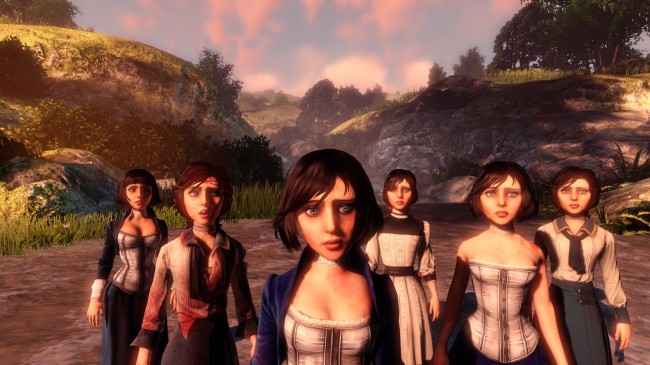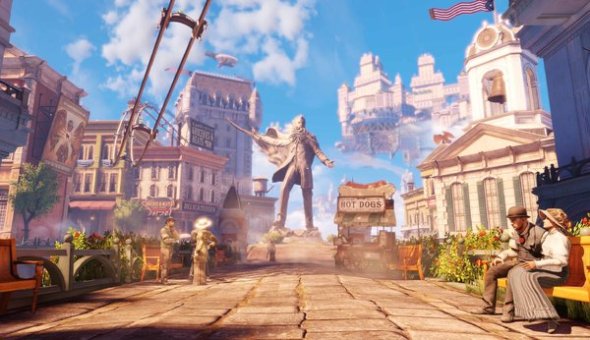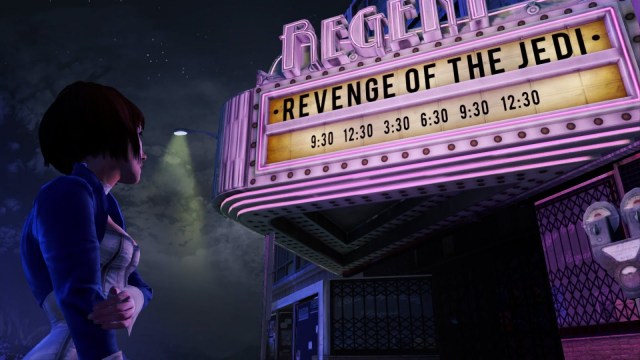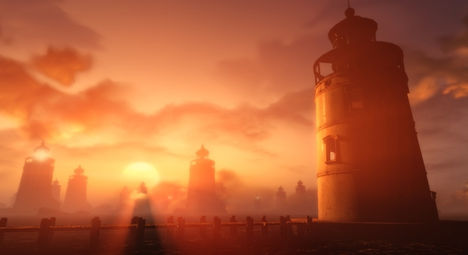Every moving fantasy adventure tale elevates its audience to some sort of transcendence. Luke discovers the ways of The Force, Frodo discovers the Ring, Neo discovers the Matrix, Harry discovers the world of wizardry, Jack discovers the secret power below the Island. In each story, the adventurers onscreen, and the audience vicariously, is invited to peek behind the curtain of reality to glimpse what it’s really all about. The transcendental power usually also functions as the story’s moral universe, showing our hero his true purpose for living. The adventurer, in order to overcome, must learn to act in concert with the transcendental power or use it as it was meant to be used. Luke has to discover not only the force but how to use it without succumbing to the Dark Side. Frodo can’t indulge in the power the Ring without being corrupted. This double purpose of enlightenment and morality shows the essentially religious character of the modern adventure fantasy. It could even be said that these stories feed off of the natural human desire for God–the discovery of a source of benevolent strength in the midst of violence and strife and a peaceful home to reach at journey’s end.
But in 21st Century we’re seeing a new deity rise in fantasy adventure fiction: the multiverse. The multiverse is the idea that there are infinite variations of our own world that exist beyond our reality. It may not be merely fictional, it’s actually a scientific hypothesis that some very smart people believe is true. Without getting into whether or not it satisfies scientific or philosophical standards for explaining reality, we can certainly judge its effect on fiction and whether or not it satisfies our need for adventurous drama.
It is fitting that the most complete treatment of the multiverse occurred in a video game. Bioshock: Infinite was one of the most anticipated video games of last year, the sequel to 2007’s Bioshock. Bioshock was a taut psychological horror trip through a dystopian underwater city. Its philosophical depth and clever plot twists were surprisingly affecting, and after finishing it, it leaves the player with the sense that they have just watched a good film. For its follow up, director Ken Levine and Irrational Studios prepared the ultimate American nightmare. A war between extreme nationalism and violent class rebellion set on a literal city in the clouds. The game does not disappoint. It is a mind-blowing trip through impressively rendered environments that seem as real as they do fantastical. The political savagery is well realized. The game’s two factions, The Founders and the Vox Populi, are affecting amalgams of real-life American extremisms. In the middle of it all, you, a disgraced hero must rescue an imprisoned princess from a tower.
Much of the game is a familiar action fantasy pastiche. You, the hero, must escort your charge from one battleground to the next, running and gunning, trying to escape, like some bloody steampunk vision of The Empire Strikes Back. But things quickly start to go wonky, and this is where the game really gets interesting. Though the year is 1912, you start hearing people humming Beach Boys and CCR, player-piano versions of Tears for Fears. Clearly, history has not traveled along the same rails as our world. Elizabeth, the imprisoned princess, turns out to have the ability to open gates to other times and places where history has followed a different trajectory. The two of you skip carelessly between worlds until you’re not even sure whether you are in the same reality as the one you started in.
By the end all is revealed and the source of transcendence discovered. There are an infinite number of worlds out there and therefore, an infinite number of “yous.” As it turns out, you are all over the place. The religious fanatic Zachary Comstock is actually another “you” from a timeline in which you’ve been baptized to wash away your past sins and became a zealot, founded the floating city and reached through time to steal the daughter of the “you” that did not accept baptism and instead went on to have a child, become a drunkard and sell his daughter for a chance at a clean slate. The princess in the tower is your daughter and the multiple histories your choices have birthed all come around to the same evil ends. Comstock steals your child, you go after her to save her, but you always fail. It is finally revealed that the only way to save the world is to return to the moment of decision and reject both baptism and life. As you drown in the baptismal waters, all the evil your choices begot dissipates around you.
This long synopsis is all very confusing, but trust me, it makes for a pretty riveting and even emotional head trip. But then, it ends with no small tinge of letdown. While the multiverse has some potential for psychological reflection it ultimately spells the end of true transcendence in fantasy fiction. Instead of introducing the hero to ethical imperatives driven by hidden elemental realities, the multiverse just opens up more space and more possibile ways for you to screw things up (or do things well, but as Bioshock: Infinite explains, it doesn’t matter how many times you get it right, as it cannot ameliorate the amount of times you get it wrong). Instead of a secret Truth that shows you the right albeit difficult path to overcoming evil, it’s revealed that evil and good are really just the extreme ends of infinite possible choice.
Mike Stokhlasa of Redlettermedia.com, a website that produces reviews of movies that are irreverent as they are insightful said of 2009’s Star Trek (which uses the multiverse conceit to reboot the franchise) the idea that there are multiple universes is a more problematic reveal than it initially appears. “Wouldn’t you just feel really insignificant?” Dramatically speaking, he has a point. Dramatic tension is necessarily dependent upon limits, death being the most important one. The finality and permanence of death creates the will to live. Also, the promise of setting things right once and for all gives the audience hope that things might turn out well. Choices have consequences that cannot be reversed, only forgiven or avenged. But factoring into your story other worlds where things go differently means that whatever happens to the main characters, there are always alternatives happening in parallel, so it matters little what happens to our immediate heroes.
Instead of an infinite God you are introduced to your infinite self. Could this be a perfected mythological realization of narcissism, like looking into a double mirror and seeing an infinite extension of reflections staring back? If so this makes Bioshock: Infinite’s suicidal ending not only appropriate but archetypal for a multiverse story. Faced with an infinite inescapable self, the only way to avoid the consequences of your (inevitable) mistakes is to cease living. It all tends toward the abolition of man. Without transcendence, you’re stuck with yourself, an infinite menagerie of of good and bad (mostly bad, if you’re as pessimistic as Ken Levine), and the only way to prevent your harm of others is to remove yourself from the equation. Bioshock: Infinite is not the first multiverse story to end in suicide. Richard Kelly’s Donnie Darko (one of my favorite psychodramas) ends the same way. Ultimately, it’s why I appreciate Levine and Kelly. They are ready to take their setup to its only logical conclusion and even make it an emotional experience. But the abolition of man is, after all, the end of consciousness and thus, the end of drama, and stories altogether.
Perhaps this amounts to the maturing of fantasy fiction, but if it does, then I’m not sure I want anything to do with it. I suppose that it results from the desire to get away from the theological element of fantasy fiction. We’ve swallowed whole the notion that religion amounts to immaturity as it creates a big cuddly deus ex machina in the sky (an image not so subtly inserted in to Bioshock: Infinite, in the character of a monstrous mechanical bird that keeps Elizabeth locked up in her tower) projecting the comoforting feeling of our parents onto the unknown. But if religious believers project a cosmic person, then I charge the proponents of the multiverse with projecting a cosmic dice-roll: mathematics and probability imagined as positive, metaphysical reality. Dramatically speaking, I’d much prefer a Deus ex Machina. At least it makes for a good story. It’s not that the multiverse breaks logic, it breaks drama and leads to an uncomfortably de-humanizing self-effecement. Maybe some sorts of stories were never meant to “mature.” Actually, I just have trouble with the idea that genres of fiction “mature.” How does that work? I thought people just wrote stories that are either poorly conceived or well-conceived, and executed them in their various media either artfully or badly. (Better let that one lie for now. Subject of a different post maybe.)
Despite all this, I believe that the multiverse is not a passing plot point, but will continue to become a more frequent fantasy staple in film and popular novels for one reason, and it’s not a surprising one given the state of modern fantasy fiction. “There are infinite worlds” means there are infinite ways to retell, repackage, reboot, and resell the same story. In a way, the multiverse is the perfect excuse to not write anything new. It is already a well-worn conceit in comic book fiction, the accepted canonical metaphysic of both the Marvel and DC Universes. The multiverse will endure in fantasy fiction because things that are profitable, modern, and hold the pretension of sophistication tend to become the order of the day.






Pingback: Book Review: Welcome to the Multiverse - My Writer's Cramp
nice